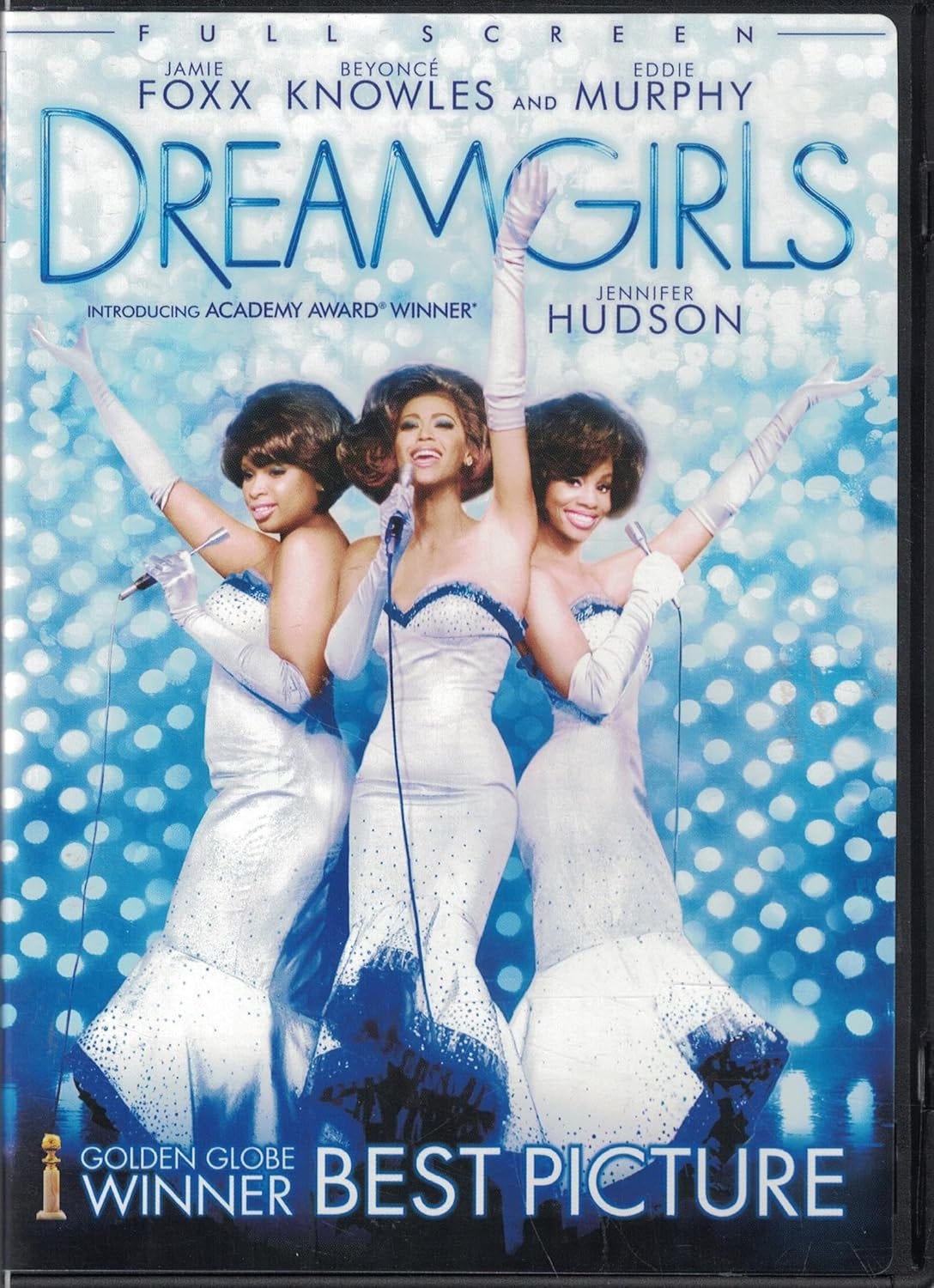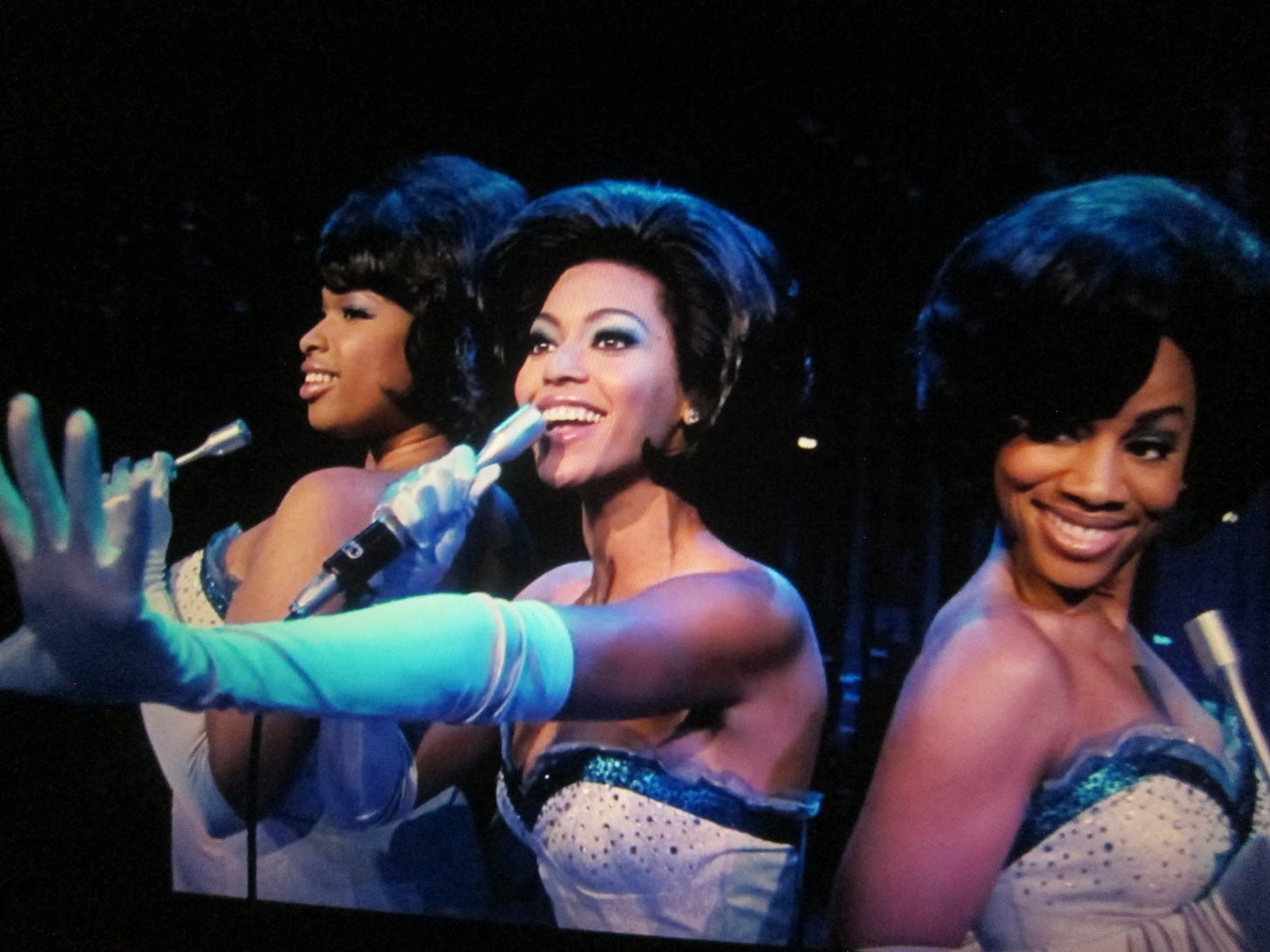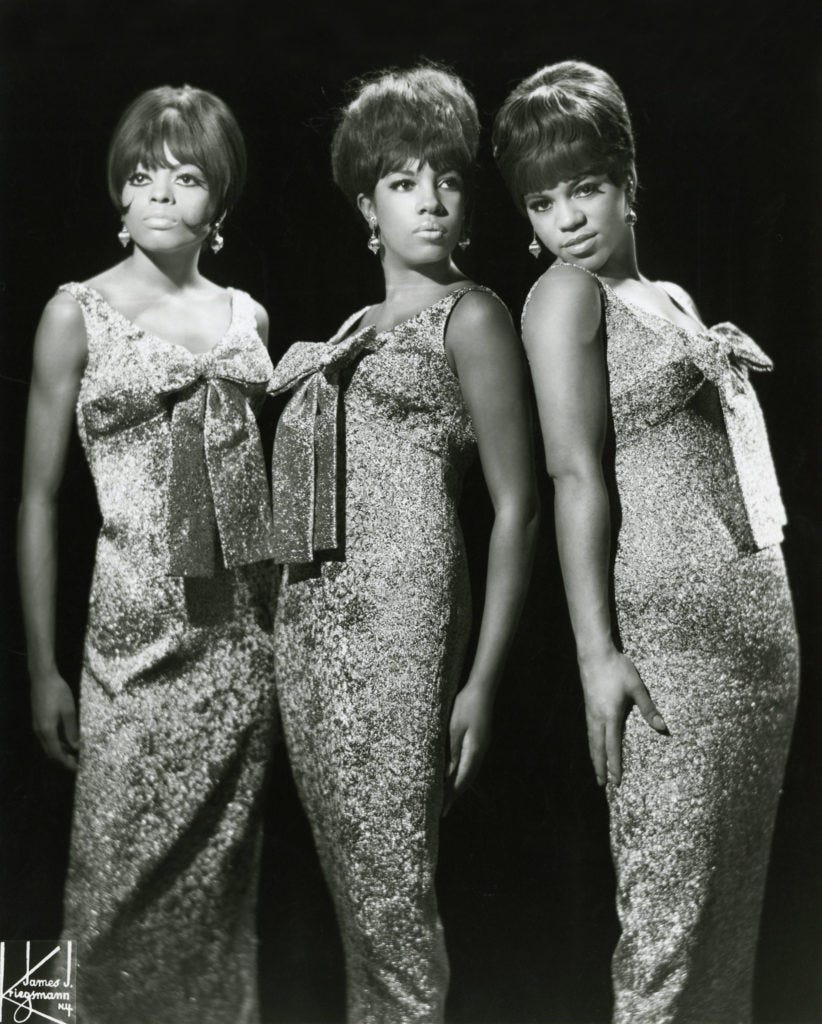Gospel married the blues and gave birth to twins — soul and rock ’n’ roll. The soul child (along with rock) grew up to dominate the 1960s with a sound and energy not duplicated since. Soul was the black answer to white blues made by rockers, some American, some British, a sibling rivalry that played out in the Billboard charts throughout the Sixties, every rock hit answered by a hit from soul.
Who were the soul artists who made the world more beautiful than it was before? Many. Oh so many. James Brown, Ray Charles, Wilson Pickett, Marvin Gaye, Otis Redding, Sam Cooke, Jackie Wilson, Curtis Mayfield, Aretha Franklin, Etta James, Mary Wells, the Platters, Drifters, Coasters, Temptations, Impressions, Crystals, Shirelles, Supremes, Four Tops, Smokey Robinson, Stevie Wonder, Al Green, Joe Tex, Solomon Burke, Brook Benton, Gladys Knight, Mavis Staples, Ike & Tina Turner, and Martha and her Vandellas. Nowhere to run, then, said Martha, nowhere to hide with soul on stage. Or on vinyl and the radio too. Soul in the Sixties was a perfect counterweight to rock ’n’ roll, both genres making the period what it was — vibrant and explosive. The names Billie Holiday and Nina Simone should also be uttered in this context, though strictly speaking they were notionally jazz and blues singers rather than singers of soul or R&B. Even so, they are definitely kindred spirits to this great musical tradition.
This film á clef is all about the power and exuberance of soul, a veiled portrait of the Motown super group the Supremes — Florence, Diana and Mary. At their height the Supremes were a hit factory, a black female corollary of the Beatles, dominating the charts with Number One songs that became immortal: “Baby Love”, “Come See About Me”, “Where Did Our Love Go?”, “Stop! In the Name of Love”, “You Can’t Hurry Love”, “You Keep Me Hanging On”, “Love Child”, and “Someday We’ll be Together”, to name just a few.
Their doppelgängers here in this exuberant biopic are the Dreamettes with stage names followed by the names of the Supremes and the actresses playing them:
Effie White (is Florence Ballard/Jennifer Hudson), Deena Jones (Diana Ross/Beyoncé), and Lorrell Robinson (Mary Wilson/Anika Noni Rose).
Effie is listed first because she has the pipes, rattling the rafters with her powerhouse vocals. She’s something else, another Aretha. Deena is second because she’s the prettiest, becoming the face of the group, its front-liner. Lorrell is last because she’s the shyest, the girl with the girl-next-door looks, the Karen Carpenter of the group. Their sound will make them famous. But in the beginning they are unknowns, clawing at fate to become something.
Dreamgirls
Soul conquers the world
The key to soul is its danceability. Its melodies, hooks and rhythms won’t allow you to sit still. You get up and shake it. If the blues are tailored for anguish, soul is a celebration of life. Kool and the Gang, the Commodores, Michael Jackson and others profited from that truth in the 1970s and ‘80s, mining the gold in soul for all it’s worth, carrying on the tradition in the face of challenges from inferior genres such as punk, disco, rap and hip-hop. Soul took gospel, added pop, then made the great crossover, reaching white audiences with its excellence, confirming again the truth that soul has no color in the democracy of sound.
Detroit, Michigan, 1962. We first meet the Dreamettes when they appear on stage, fresh and green in their bright orange outfits. Jimmy Thunder Early (James Brown/Eddie Murphy) is the raucous, closing professional act for the night. Jimmy is a shouter and groaner, a holy roller with funk. He drops to his knees not to pray but to dramatize the power of soul. He’s on his knees to be anointed King, and in that posture the shouting audience anoints him. He is regal, dominant, beautiful. He’s the King of Soul and laps up the adulation, beaming and brimming with self-confidence. Jimmy is King and loves his crown. All hail the King!
Jimmy Thunder Early (Eddie Murphy). All hail the King!
After this it’s amateur night with a series of singers waiting in the wings, all of them nervous in the face of the King but hoping anyway to become big-time stars. The Dreamettes go on fourth, the final amateur act for the night. They’re jittery and perspiring but it hardly shows. They look seasoned when they come on, their endlessly rehearsed dance moves choreographed to perfection. They are beautiful. They wow the audience and catch the eye (and ear) of Curtis Taylor, Jr. (Berry Gordy, Jr./Jamie Foxx), the former Detroit used-car salesman now turned soul promoter and producer, owner of Rainbow Records (= Motown Records). The Dreamettes — soon to be called just the Dreams — are on their way. And of course they don’t know it (no one does) but their success will eclipse their wildest dreams. Hence their name, a perfect fit. They are primed to live out the American Dream. They will become, as history records, the greatest soul girl group of all time with 12 Number One singles in the Billboard top 100. In fact, Billboard ranks the Supremes as the 16th greatest musical group of all time, their influence enormous and incredible. They didn’t just open the door for other black acts to follow; they kicked it down. Only the great Ray Charles did the same. They made gospel and soul accessible and acceptable to the wider world.
So this is their amazing story, highly stylized and choreographed for the stage on Broadway (1981) then adapted beautifully here for the screen (2006), winning several awards. It’s a treat to look at, as the photo below suggests.
The Dreams, left to right: Effie, Deena, Lorrell — classy, beautiful, irresistible. Look at that look by Lorrell. She’s in the zone!
Like everyone else, Curtis Taylor, Jr. is immediately attracted to the Dreams. In particular, Effie’s powerhouse vocals and charisma attract him. Upfront he offers to manage and record them and of course they are thrilled. They accept.
Curtis is married or estranged but he won’t let this social inconvenience interfere with his pursuit of Effie. For her part she has no moral qualms, either, which sets up a stressful dynamic within the group. Effie’s problem is that she knows she’s talented, a better singer and performer than Deena and Lorrell, and as a diva with outsized ego she can’t help lording it over them. For their part, though highly displeased, Deena and Lorrell acquiesce, as they’re not dumb and know Curtis holds the power to their future. One might think by now that all blacks would know that slavery was and is an evil social institution, but apparently Curtis never got the message, or if he did he doesn’t care. Once the contract is signed, favoring Curtis of course, not the Dreams, the girls have little say in what will come down.
Driven by ego, greed and ambition, Curtis Taylor, Jr. (Jamie Foxx), plantation owner of Rainbow Records.
Naturally, Curtis is fickle, as sultans with their harems always are. They can afford to be self-centered and demanding, as there is no oversight or accountability involved. Eventually, inevitably, Curtis starts to grow tired of Effie. Her personality is volatile, tempestuous, unreliable. The usual diva profile. Deena’s singing voice is weaker than Effie’s but she’s beautiful and has that million-dollar smile, so much white against the beautiful black. Placed in the center she shines, all eyes on her, including the eyes of Curtis. Once it was Effie; now it’s Deena. For Deena this will be more problematic. Center stage is welcome, but the advances of Curtis are harder to deal with. Plus Deena isn’t a diva. She’s a pure democrat and values the equality and solidarity of the group. So the tightrope she must walk is thin and hazardous. How to please both Curtis and the Dreams? Not an easy question and situation.
Resolution is eventually achieved by crisis. Eaten up by jealousy and a sense of betrayal, Effie quits the group. Now it’s firmly Deena’s with her in the starring role. This in turn changes her dynamic with Curtis, making her more receptive to his advances.
Lorrell meanwhile is smitten with the King, a complete supplicant. She knows Jimmy is married, but so what? This won’t change the feelings she has in bed with him. Mistress, wife, what’s the difference if she can have Jimmy? That’s the arrangement and Lorrell is content with it.
All this seems foretold, inevitable, the mix of sex, glamour and stardom too rich to resist. So that’s their world, the dues that must be paid to become the stars they wish to be. It isn’t pretty on some level. But neither was poverty, racism and obscurity. As the Beatles sagely said, they had a ticket to ride. But that doesn’t mean the journey would be smooth. There never really is an easy way. Everything involves sweat and pain.
For Effie it wouldn’t be easy at all. Outside the protective bubble of Curtis and Rainbow Records she struggles to make it on her own. Eventually the funds begin to dry up and she applies for public assistance, going through the humiliating red tape of meeting the standards of eligibility — she the diva, the star of the show, reduced to this. Plus she’s not alone. She has a young daughter named Magic who appears to be fatherless. At any rate, there’s no man around. So it’s now Effie against the world.
However, the story doesn’t mean to be tragic, no matter what happened in the real life of Florence Ballard (she died impoverished). In Effie’s case her greatest asset never leaves her — her glorious singing voice. At some point things stabilize financially and she begins to regain her self-confidence. An old ally named Marty Madison (Jimmy Early’s former manager) acts as her agent and begins to get her spot gigs in bars, and once on stage again she begins to wow audiences with her glorious pipes. Letting loose is still her ecstasy, as it has always been. In that element, that comfort zone, she truly shines, transcendent to the point of angelic, knockin’ on heaven’s door in order to sing to God. It’s all so splendid to witness.
The other Dreams take notice through the grapevine. They never really wanted to lose her. She was the original center of their dreams. So even now when the group is on top of the world, mega-stars in America and abroad, they haven’t forgotten their Motor City roots and history. Despite everything they will always love Effie. Which is why in their lavish farewell concert that closes the show and film the Dreams are a foursome, not a trio, with Effie back at center stage, Deena lovingly moving over to make room. Thus the ultimate feel-good ending, the power of soul to defeat everything. The lights, the glitter, the glamour are Effie’s once more. The diva is back and devours every second of the adulation. The leopard can’t change its spots and that’s O.K. She is what she is and has always been.
Florence Ballard was the voice of the Supremes. She was the group’s Aretha Franklin. Diana Ross could sing, there’s no doubt about that. But as much as the voice were the optics. She was the beauty in the group and Berry Gordy knew she would sell it. And he was right. Mary Wilson and Cindy Birdsong (Florence’s replacement) went along for the ride. In the end it was Gordy’s group all along. He made them rich and famous, and made himself rich too. Motown Records was the magnet that drew the great soul artists to it. But, as previously stated, it was the Supremes who kicked down the door to let them in. Here in this film the beautiful Dreams pay tribute to the greatest girl soul group the world has ever known. The songs and performances are breathtaking. This is the story of how soul conquered the world. All hail Florence Ballard, Diana Ross and Mary Wilson — THE SUPREMES!
Supremely talented, left to right: Diana Ross, Mary Wilson, Florence Ballard.
Released on May 1, 2007. Running time: 2 hours and 11 minutes. Magnificent!








